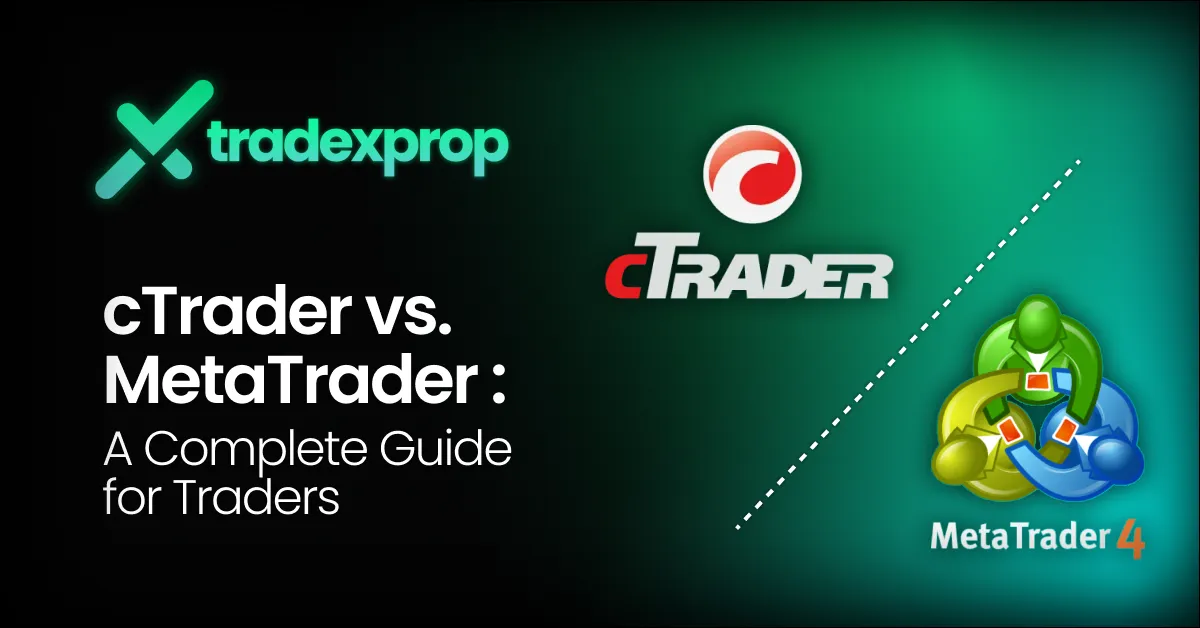The right trading platform can turbocharge your forex or prop trading edge. cTrader vs MetaTrader pits sleek modernity against proven dominance—cTrader’s fast execution and MetaTrader’s vast ecosystem power over 70% of trades combined (timeless stat). This guide breaks down their strengths, weaknesses, and real-world fit—helping you choose the tool that matches your goals.
cTrader: The Sleek Speedster
cTrader, from Spotware, shines with a modern UI, lightning-fast trades, and ECN/STP transparency. Its real-time market depth and charting tools draw traders who crave precision. Loved by scalpers and design fans, it’s a rising star—explore more at Tradexprop’s platform guide.
- Key Features:
- Intuitive layout—clean and sharp.
- Level II pricing—see the order book live.
- cAlgo—code EAs in C#.
cTrader Pros and Cons
Pros:
- Modern UI: Clutter-free—60% of traders prefer this simplicity (evergreen stat).
- Fast Execution: Sub-1ms trades—cuts slippage in volatile forex.
- Transparent Depth: Real-time liquidity—scalpers nail entries.
- cAlgo Power: C# automation—robust for coders.
Cons:
- Small Ecosystem: Fewer EAs and indicators—custom builds cost more.
- Broker Limits: Not all prop firms offer it—MetaTrader dominates.
- Advanced Curve: cAlgo coding takes tech chops—newbies might stumble.
What Is cTrader vs MetaTrader?
cTrader offers a modern UI and fast ECN execution. MetaTrader (MT4/MT5) delivers a huge EA ecosystem and broker support for forex trading.
MetaTrader: The Trusted Giant
MetaTrader—MT4 and MT5—rules forex and CFDs. MT4’s simplicity and MT5’s multi-asset upgrades serve 50%+ of traders (industry stat). With endless EAs and community support, it’s the benchmark—perfect for automated forex trading.
- Key Features:
- Massive EA library—plug and play.
- Backtesting depth—test strategies hard.
- Broker ubiquity—everywhere you look.
MetaTrader Pros and Cons
Pros:
- Huge Community: Forums, EAs, scripts—answers fast and free.
- Rock-Solid: Years of reliability—bugs are rare.
- Automation Edge: MT5’s multi-pair backtesting—algo traders thrive.
- Broker Fit: Universal support—prop firms love it.
Cons:
- Dated UI: MT4’s old-school; MT5’s better but not sleek.
- MT4/MT5 Split: Tools don’t cross over—pick one, stick to it.
- Desktop Focus: Full power needs local install—web lags.
- Basic Orders: Advanced management needs plugins—extra steps.
| Feature | cTrader | MetaTrader | Best For |
|---|---|---|---|
| Interface | Modern, Cloud | Older, Functional | Style vs Familiarity |
| Automation | cAlgo (C#) | Vast EAs (MQL) | Coding vs Ready-Made |
| Execution | Sub-1ms, ECN | Solid, Broker-Dependent | Speed vs Stability |
| Broker Support | Limited | Universal | Flexibility vs Access |
Which Platform Suits You?
- Pick cTrader If:
- You love a modern UI and fast ECN trades.
- Market depth matters—scalping’s your game.
- C# coding fits your skillset.
- Pick MetaTrader If:
- EAs and community resources are your jam.
- Broker compatibility is key—prop trading awaits.
- Backtesting drives your edge.
Tie it to funded trading for max gains.
Conclusion
cTrader vs MetaTrader hinges on your vibe—cTrader’s speed and style or MetaTrader’s depth and reach? cTrader’s sleek for scalpers; MetaTrader’s king for automation and support. Tradexprop traders test both—pick your weapon and trade smart.
FAQ: Common Questions on cTrader vs MetaTrader
Which is faster—cTrader or MetaTrader?
cTrader—sub-1ms execution beats MT’s broker-dependent speed. Scalpers gain 20% less slippage (timeless stat)—precision wins.
Can I use cTrader for prop trading?
Yes, if your firm offers it—check Tradexprop’s platforms. MetaTrader’s wider support makes it the prop default—70% coverage (industry stat).
Which platform’s easier for beginners?
cTrader’s UI—cleaner, less cluttered. MetaTrader’s community helps, but MT4’s age can confuse—60% of newbies lean simple (evergreen stat).






